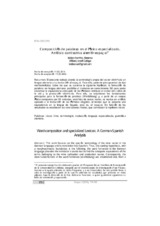Composición de palabras en el léxico especializado. Análisis contrastivo alemán-español
Word-composition and specialized Lexicon. A German-Spanish Analysis
Autor
Ramírez Almansa, Isidoro
Editor
UCOPressFecha
2016Materia
VinoTerminología
Traducción
Lenguaje especializado
Gramática alemana
Wine
Terminology
Translation
Specific purposed language
German grammar
METS:
Mostrar el registro METSPREMIS:
Mostrar el registro PREMISMetadatos
Mostrar el registro completo del ítemResumen
El presente trabajo aborda la terminología propia del sector vitivinícola en lengua alemana y su traducción al español. Para ello, parte de presupuestos de tipo morfosintáctico, sobre los que se sustenta la siguiente hipótesis: la formación de palabras en lengua alemana posibilita al traductor un conocimiento útil para poder encontrar la equivalencia adecuada de los términos relativos al sector del cultivo de la vid y la producción vitivinícola. Para ello, se establecen los fundamentos principales para la formación de palabras (Wortbildung) y, a partir de un corpus léxico compuesto por 85 entradas, extraídas de textos reales, se realiza un análisis aplicado a la traducción de los términos elegidos, al tiempo que se propone una equivalencia en la lengua de llegada, esto es, el español. En función de los resultados se establecen las conclusiones finales, que corroboran la hipótesis inicial. This work focuses on the specific terminology of the wine sector in the German language and its translation into Spanish. Thus, the starting hypothesis, with a morphosyntactic foundation, is the following: the word formation in the German language provides the translator a useful tool to find the adequate equivalence of the terms belonging to the wine cultivation and production sector. Consequently, the main fundamentals of the word formation (Wortbildung) are established and, from a lexical corpus which is composed of 85 terms which were extracted from real texts, an applied analysis to the selected terms is carried out, and at the same time it is proposed the equivalence in Spanish, that is, the target language. According to the results, it is established the final conclusions which corroborate the starting hypothesis.

